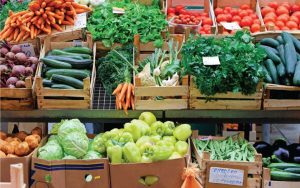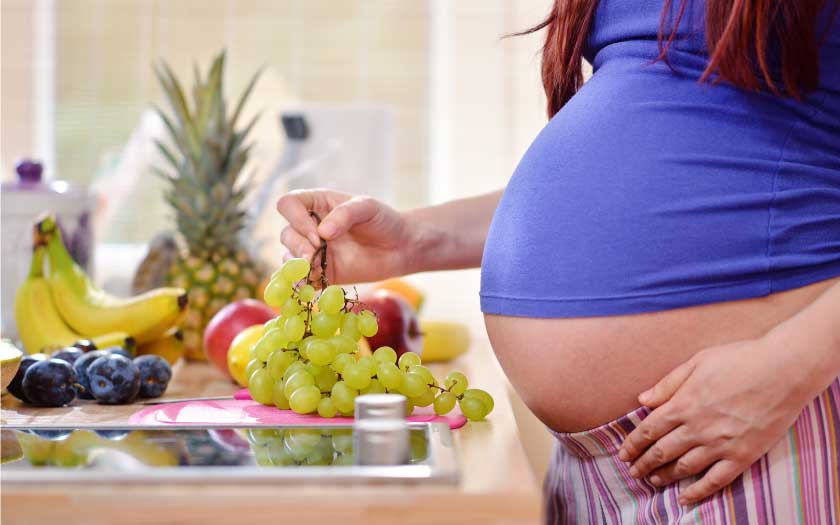As long as we consume conventionally grown food or products made from them, we might as well resign to the fact that we’re unwittingly ingesting loads of chemicals each day due the pesticides, herbicides, antibiotics and other chemicals used.
While everyone is at risk, babies in their mother’s womb are at the most unfortunate end of this situation for their moms could be contributing to their future health issues. The ultimate solution is not just healthy food, but organic food, grown or produced without the use of chemicals.
Chemical-laden food contributes to a spectrum of health problems including cancer, lung disease, reproductive problems, and potential disorders within the immune system. They can permanently change the brain chemistry of a vulnerable fetus, leading to future behavioral disorders, learning disabilities, and even long-term damages to the brain and nervous system.
Chemicals are widely consumed in the form of pesticide residues on fruits, vegetables, and crops. They can also be consumed through affected dairy, poultry, and meat products. For a pregnant woman, these chemicals can easily reach her growing fetus. It will also be passed to her baby via her breast milk.
Why go organic?
Certified organic produce is grown without using harmful pesticides or synthetic fertilizers. Likewise, certified organic meats, eggs, poultry, and dairy come from animals that are allowed access to the outdoors and have not been given antibiotics and growth hormones. Such animals are only fed with organic feed.
The thing about organic food is, they’re not just good for your health and that of your unborn baby, but the whole practice of organic produce itself is beneficial for the environment and ultimately, our planet. Organic farmers use natural methods in all areas of farming such as crop rotation and pest management and avoid the use of toxic chemicals which can persist in the environment for years. This way, our water sources, land, and air are protected from contamination.
Regardless of where it’s grown, organic foods have to meet with a set of standards to be certified as organic. During growing, handling, and processing, there should be:
- No pesticides
- No chemical fertilizers
- No weed-killers
Food also can’t be:
- Genetically modified
- Injected with or given hormones or antibiotics (for chicken, beef, etc.)
While the availability of organic foods seems to be of a little issue nowadays and there are organic sections found in most supermarkets, organic farms must however adhere to strict standards. The overall costs of food production and handling are higher compared to conventionally grown and produced food and this is ultimately reflected in the price tags of organic products. Hence, while it would be highly beneficial for pregnant moms to go fully organic, not everyone can afford to do so.
USDA Organic Seal guidelines
- If the food product is labeled 100-percent organic, it has to contain only organically produced raw or processed products
- Foods that are labeled organic must contain at least 95 percent organically produced ingredients (excluding water and salt)
- If the food product label reads made with organic ingredients, it must contain 70 percent organic ingredients
Note too, that foods that are only labeled organic on the ingredient side label and not the main label, contain less than 50 percent organic ingredients only.
Know which foods to buy organic
The health benefits of fruits and vegetables make it unwise to omit them for the sake of avoiding pesticides, and since it’s not always possible for most pregnant moms to be eating organic, it’s always good to know how to make the best choices in foods. The Environmental Working Group, an American environmental organization that specializes in research and advocacy in the areas of toxic chemicals has identified two groups of fruits and vegetables according to their pesticide residues present in them. They are called the Dirty Dozen and the Clean 15.

The Dirty Dozen
The dirty dozen consists of foods that are most contaminated with pesticides and/or with pesticide residue which are difficult to clean off. Needless to say, it’s best to buy these from the organic section of your supermarket.
1. Apples 7. Spinach
2. Peaches 8. Sweet bell peppers
3. Nectarines 9. Cucumbers
4. Strawberries 10. Cherry tomatoes
5. Grapes 11. Snap peas
6. Celery 12. Potatoes
Note: Added to this list are chillies and kale.
The Clean 15
This list consists of fruits and vegetables that are the least contaminated with pesticides. As such, they need not be organic.
1. Avocados 9. Papayas
2. Sweet corn 10. Kiwi
3. Pineapples 11. Eggplant
4. Cabbage 12. Grapefruit
5. Sweet peas 13. Cantaloupe
6. Onions 14. Cauliflower
7. Asparagus 15. Sweet potatoes
8. Mangos
Other foods that are best to buy organic are:
- Meat. These are grass-fed, free from antibiotics and growth hormones, and are generally lower in calories and fat. Organic meats are also believed to be higher in protein than conventional meat.
- Poultry and eggs. Look for free-range poultry, for they are less likely to carry dangerous diseases from being kept in cramped, disease-breeding quarters.
If an exclusively organic diet is out of the question, here are some other ways you can reduce your exposure to pesticides:
- Wash all fruits and vegetables before consuming or cooking. Safe, trustworthy products that can be used for this purpose include Pigeon Liquid
- Cleanser and Backoff Organic Fruit & Vegetable Wash.
- When using fruits that aren’t organic, always peel them first.
- Discard the outer leaves of foods like lettuce and cabbages before use.
- Pesticides accumulate in fatty tissues, so remove visible fat from meats and remove skin and fat from poultry too.
- For that same reason, buy organic butter, cheeses, and milk. Alternatively, you could go for low-fat versions.
Cook @ Home more often
If you’re in the habit of dining out, ordering in or consuming processed packaged foods, it’s time you make a change for the better, for you can never be entirely sure what you’re eating if you keep doing so. Start preparing your meals at home with fresh, whole ingredients for it gives you maximum control over what you eat.
That way, you can ensure an optimally safe and healthy diet during your pregnancy. In the long run, healthy cooking is after all a necessary parenting skill for all the baby food prep, school lunches, and more that you have ahead of you. Start now and make a habit of it!
Reminder
When it comes to raw foods, never take it for granted that just because it’s organic it’s completely safe to consume. Though it won’t be treated with pesticides, organic foods can still be contaminated with bacteria. Always wash your produce before consuming and cook your meat, poultry, and fish thoroughly too.
Featured image source: www.pushgym.com


